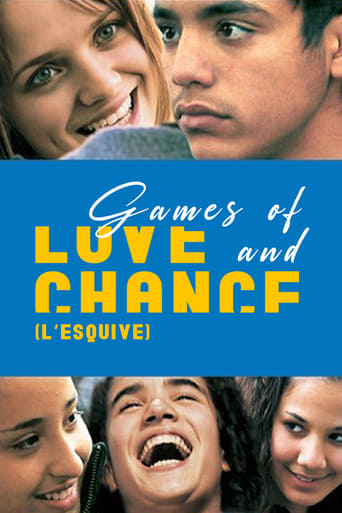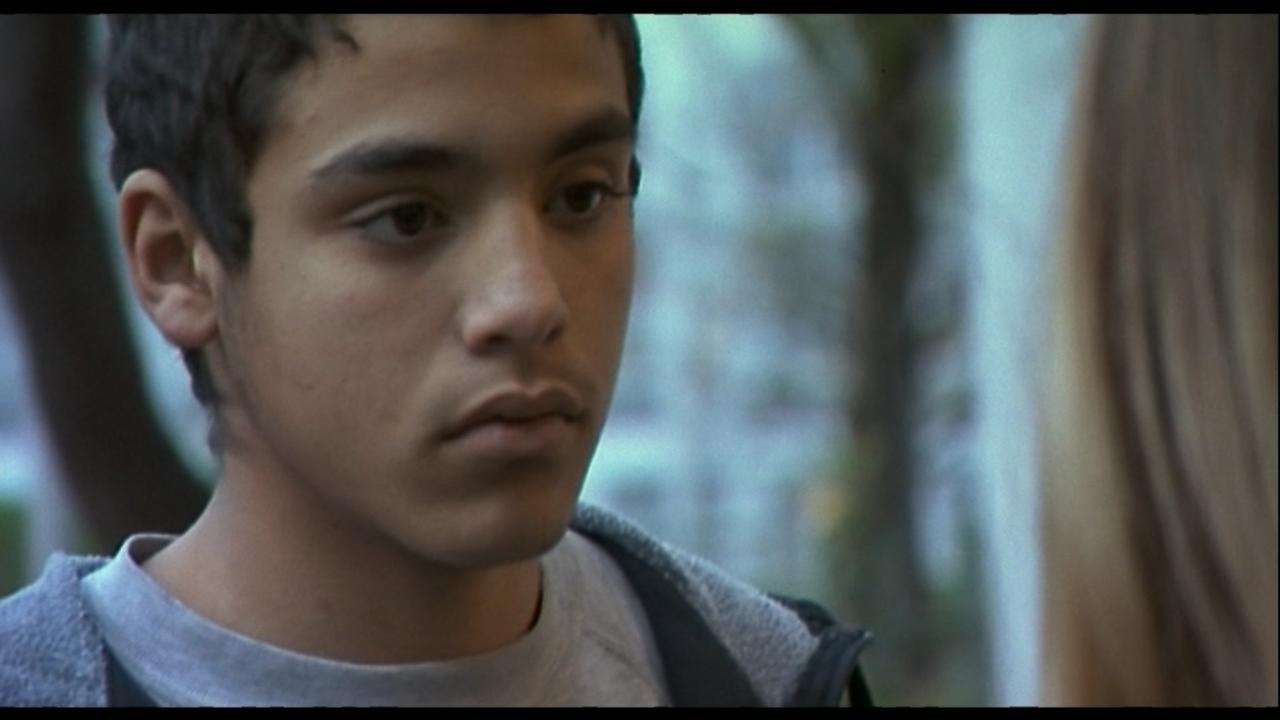Kinlever Kinlever
Its a very multilayered film. It looks rough and row, however, its just a directing trick, mostly because its about kids, and young actors. However, its a complex social drama, where the most important stuff are on the margins of the script, yet quite visible.Its about the troubled, tenage poor kids from the typical suburb blocks of flats whose life looks very simple, although at the same time full of hardships, and difficult situations: lack of money, conflicts with other kids, fathers in prison, etc. There is a lot of anxiety and aggression in their dialogues, although only in the end of film we see the pressure they live under, and race and class struggle that exist in French society. All the jovial representations of the class differences from Marivoux' play, used in the film, get quite a rustic, hyper realistic and graphic shape in the actual context of the kids' lives. What is in background of the story is a bit unspoken social and ethnic background of the girl, Lydia, who is blond, while everyone else is clearly of African or Asian ethnic origin. Lydia might not even be a "European" French, she could be a Muslim too, just her white skin, light hair and eyes, imply certain "trouble" for possible love plot in the film. For some reason, she is different, and often called names by other jealous girls or guys. On the other hand, she also seems quite aware of her distinction. The irony of the fim is that they are all French, just they have not been treated like ones. So the kids in the film are even half-supportive of Lydia and Krimo's potential dating, since they all grew up together, so they still dont apply racial and class distinctions. They do try to see it as an ordinary coupling, and give it a romantic dimension. However, the harsh reality of their lives will come between them. Krimmo himself is a depressed and almost mute guy who desperately tries to be with Lydia. In the end we suspect that its not even love what drives him, but more like some kind of desperate move, desire for escape, wish to bring a difference in his life, with a clear expectation that he would be either turned down by Lydia, or exposed to some other trouble. Krimmo is suspiciously lifeless, which is explained by his father being in jail. However, he is obviously depressed kid, with desperate idea of reaching something extraordinary in his life, which will always stay out of his hands. All female roles in this film are outstanding. Script and directing are very efficient, in spite of long scenes of disputes and conflicts. Kechiche is apparently very good at getting the maximum from his actors. This is highly recommended film.
nmegahey
Abdellatif Kechiche's L'Esquive focuses on the less than glamorous lifestyles of the kids in the Parisian suburban 'banlieue'. Its low-budget, shaky hand-held gives the impression of realism, as does the ghetto-speak delivered by the young mostly non-professional actors, but I doubt that most impoverished, minority race Paris suburban youths consider rehearsing 18th century plays as their preferred outdoor leisure activity.That might give some indication of just how heavy-handed L'Esquive is, a school production of Marivaux's 'Games of Love and Chance' being shoehorned in to draw parallels on how social divisions and prejudice are not just tolerated, but actively enforced by the society and the authorities to the extent that those repressed come to believe that they aren't deserving of anything more. The use of language meanwhile is used to compare and contrast those social divisions and attitudes, showing in the process that essentially, people are pretty much the same regardless. Just in case you don't get it though, a police squad swoops down at the kids at one point to make sure they know their place and don't get any ideas above their station.It's a relevant subject and one of particular social significance at the time the film was made, leading the Césars to shower it with awards for tackling such edgy material. Any good social points the film has to make however are negated by its storytelling and film-making deficiencies. In addition to being heavy-handed, it's tedious in the extreme - a banal, badly-acted story of attraction between profoundly irritating ghetto kids bickering at the tops of their voices for what feels like an interminable two-hours.
acrmartray
I really did like this film! - those viewers, French or otherwise, who have seen, and been able to follow the sound track of La Haine, will be quite at home in this environment, will know what to expect, and will be sensitive to the message the film conveys. True, it may lack the sort of 'excitement'that some film-goers may seek, but one has to take it for what it is: a hard-hitting social document which will resonate with many who are familiar with the inner-city tensions found in many French towns in recent years. The gambit of choosing amateur actors worked very well,in my opinion, a point which other viewers seem to echo.
Omar Mouallem
L'Esquive is the coming (and going) of age story about Krimo, a resilient, emotionless, passive teenage boy living in a French ghetto. He is surrounded by his macho violent homeys, confused girlfriend, conniving teenage girls and a beautiful actress named Lydia, played by what may be the Olson Twin's long-lost triplet.It plays out like the French "Kids", without the poignancy. It's tedious. In fact, it gives new meaning to tedious. These shrill teenagers are constantly at each others throats. The few moments of calmness were not enough to hold people in there seats at the Vancouver Film Festival. After 40 minutes of hormonal bickering, the theater was half full.There is not enough story or character to keep this going. In needs to be taken back to the editing room and trimmed of down 40 of its 120 minutes. No doubt this would leave you with a short tale, but it's as long as this thin story needs to be told. Many scenes are used to explain what we've just scene. One-topic dialogue runs for as long as 10 minutes, in pointless circles until an opening is made for another superfluous scene.However I will say that the drama is very realistic and plays out in a natural ways that is commendable. But for story and entertainment's sake, things need to be cut, sharpened, explained and unexplained.As the end neared, I could feel my ears trembling, knowing that whatever the climax was, it would be ten times more shrill and irritating as the rest of the script. But I was wrong. Not only was it quieter and tolerable. It was void of a climax, at all. Not only is there no character change, but there seemed to be an adamant effort to avoid this natural convention at all odds. Even of it could have saved the movie.There are short moments of charm, wit, humor and a minuscule amount of beauty. However, L'Esquive is nothing you can't find at your local Blockbuster.


 AD
AD
